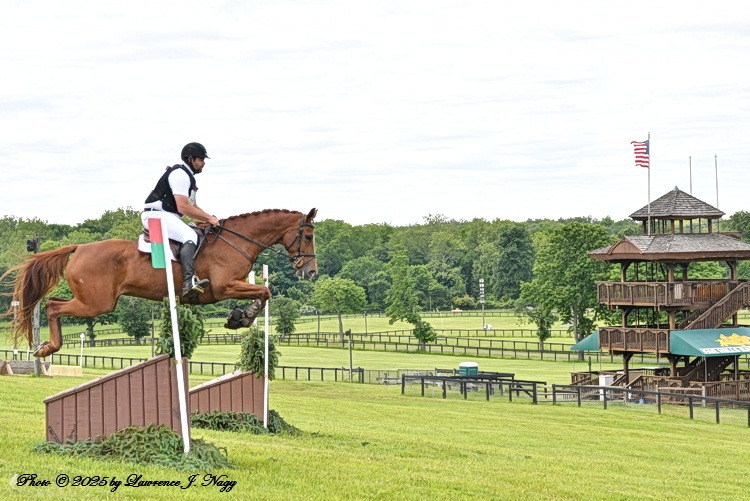
by Nancy Jaffer | Jun 2, 2025
An eventing competition that nearly didn’t happen contradicted the skeptics with a memorable Sunday of sport at Moorland Farm in Far Hills, N.J.
“It was a total success,” declared eventer, trainer and Olympic judge Marilyn Payne, who rode in the first Essex in 1968 and was determined its 2024 edition wouldn’t be the last.
She stepped up to be the organizer, despite fears that the event wouldn’t attract enough competitors to break even. But 124 riders participated during the weekend and loved the experience, despite ground that was a bit squishy here and there due to torrential rain the previous week.
“I think they’ve done an absolutely great job handling the weather,” said Nicholas Hansen, who came from central Pennsylvania to win the Open Preliminary on Mr. Max.
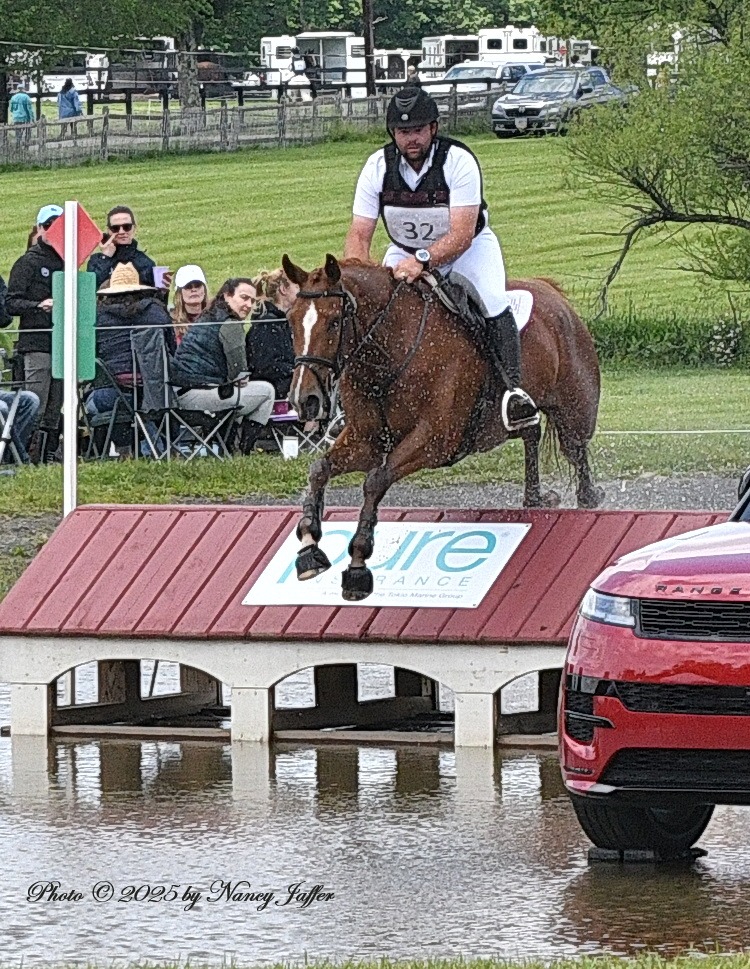
Tailgaters cheered on Open Preliminary winner Nicholas Hansen at the water complex. (Photo © 2025 by Nancy Jaffer)
“I think they did as well as they could have with the ground and as always, they put on a pretty well-run show. I have to say it was really cool to see so many spectators, especially around the water (complex). It was great to see the community came around and supported the show so much.”
Marilyn faced quite a task in her quest to make sure that Essex could run. She correctly figured the way to insure it happened was to downsize from a two-venue, two-day fixture to a one venue, one day event at scenic Moorland Farm in Far Hills,N.J., home of October’s popular Far Hills Race Meeting.
I asked Marilyn’s daughter, competitor Holly Payne Caravella, who was second with Quality time in Open Training, how she reacted when her mother took on the daunting task of making sure Essex survived.
“She’s so good at that stuff. It comes naturally to her,” Holly observed matter-of-factly.
While Marilyn was optimistic about how the event would run, she commented as Essex wrapped up, “It was way better than I thought. It was so exciting to see all the riders come out and have such a fabulous time. The hundreds of spectators enjoyed watching the horses and going to the trade fair. The tailgating was packed and they all were cheering every time a horse went through and the riders just loved it.”
After spending thousands of hours on perpetuating Essex, she committed to doing it all again next year, “as long as all my helpers will do it with me. I have a fantastic team. I could not do it without all the great volunteers I had,” she emphasized.
“It was muddy, but we dealt with it,” Marilyn commented, noting how volunteers moved the show jumps after each division to make sure they were out of the muddy tracks.
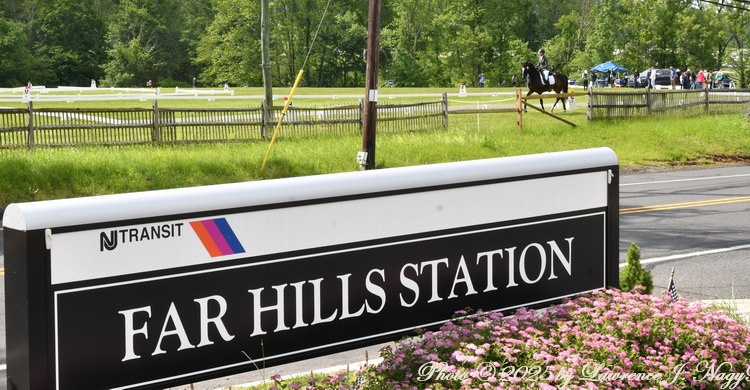
To avoid a muddy area originally planned for dressage, that segment was moved to a dry corner of the property across from the train station where the choo-choo whistle caused no problems. (Photo © 2025 by Lawrence J. Nagy)
The competitors liked the way the cross-country and stadium jumping tracks, both designed by Morgan Rowsell, worked out on the all-grass terrain.
The busiest rider at Essex, Ryan Wood, said, “They did a great job working with what they had and it was as good as you could have hoped for.”
Ryan won the Open Training division with the Optimist, an Irish import from Cooley farm who will be coming up for sale soon. and was also third in that section with Cooley Versace who is “looking like he will be a top-class horse.”
In the Open Preliminary, he was fourth with KHH Cooely and sixth with Cooley Maestro.
A native of Australia now based in Pennsylvania, Ryan is no stranger to Essex. He took the $20,000 Preliminary title on Ruby in 2018 when Essex (which has had its ups and downs) re-emerged on the scene after not having been contested since 1998.
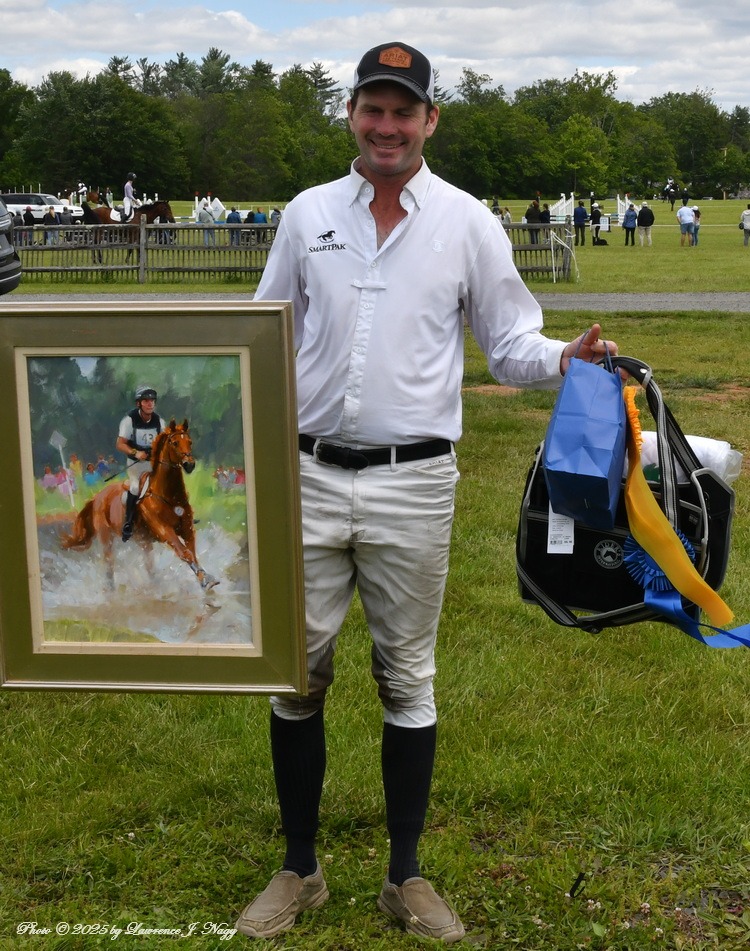
Ryan Wood with his prizes and a painting of his 2018 Essex winner, Ruby. (Photo © 2025 by Lawrence J. Nagy)
Ryan came up to New Jersey from competing Saturday in the Maryland Combined Training Association Horse Trials with four horses. He withdrew them from that event before cross-country noting, “It was pretty wet down there,” since the facility was lacking the extra day to dry out that Essex enjoyed.
Asked why he was aboard so many horses, Ryan replied straight-faced, “I was riding for an owner who puts a lot of pressure on me.”
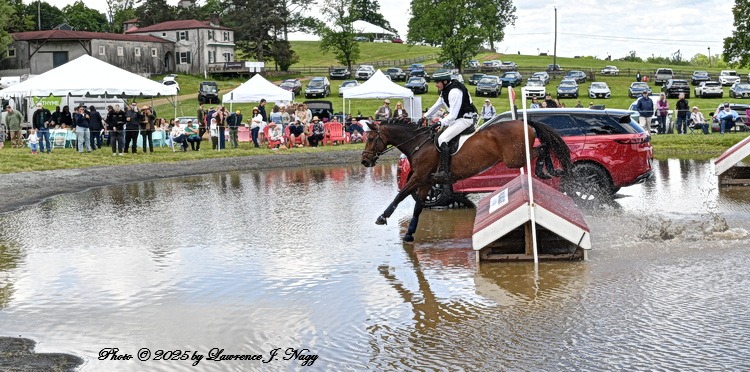
Open Training winner Ryan Wood on The Optimist. (Photo © 2025 by Lawrence J. Nagy)
That would be his wife, the former Lillian Heard, who is pregnant. Funnily enough, Nick, the Open Prlim winner, got the ride on the Dutch-bred Mr. Max because his wife, Hanna, also is pregnant.
The horse’s owner, Marsha Nahra, bought the Dutch-bred mount for Hanna, but since March, Nick has been keeping the 8-year-old chestnut gelding going until after the baby arrives. Then Hanna is looking at building toward a 3-star event in the spring.
“I thought the show jumping looked really challenging today, and he made it look effortless,” she said of her once and future mount.
An “A” Pony Clubber, Nick evented through the 3-star level, but hasn’t done any “real eventing” for nine years. He’s better-known as a dressage rider, having won triple gold in that discipline at Young Riders on a horse he got through Lendon Gray, and also did the Under-25 grand prix.
He and his wife have a training and sales business, Roaring Creek Farm, where he handles the dressage side of things and Hanna deals with the jumping.
But as Nick observed, “It’s a nice breath of fresh air to just be able to run and jump and not worry about the dressage work.”
The decision to focus on the lower levels and add the Starter division to the Essex program paid off. Starter was very popular, drawing two sections of riders. Olivia Hickok, who won the A section, wore a shirt to match her horse’s name, Huckleberry. He was adorned with a lightning bolt on one flank and stars on the other.
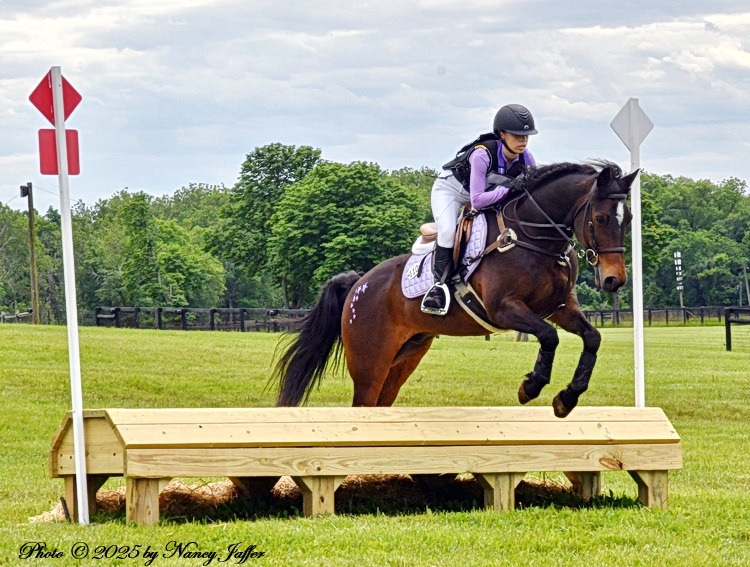
Olivia Hickok and Huckleberry. (Photo © 2025 by Nancy Jaffer)
Although the Somerset Hills Pony Clubber has competed at novice level, Olivia dropped her Morgan/Standardbred cross down to Starter because he is 19 years old.
Olivia, an extremely poised 15-year-old high school sophomore from Tewksbury, N.J., said of her Essex experience, “I love this event. It’s a great local event for family and friends to come out to watch. I love the tailgating part of it, so much support, the shops and everything.”
For the second year in a row, Olivia received the Golden Nugget Memorial Trophy for the Pony Club member under 18 who had the lowest number of penalties. Coincidentally, the trophy is given by her trainer, Clarissa Wilmerding.
The other special award, the Jean and Eliott Haller Perpetual Trophy for Horsemanship, awarded in memory of the Essex founders, went to Adelaide Reist, a Starter competitor who never gave up with Firecracker, a horse who offered a bit of a challenge.
Julia Cutler riding Marilyn’s Rock Me Mama won the Adult Amateur Best Score Award in winning the Beginner Novice B Rider section with 30.3 penalties.
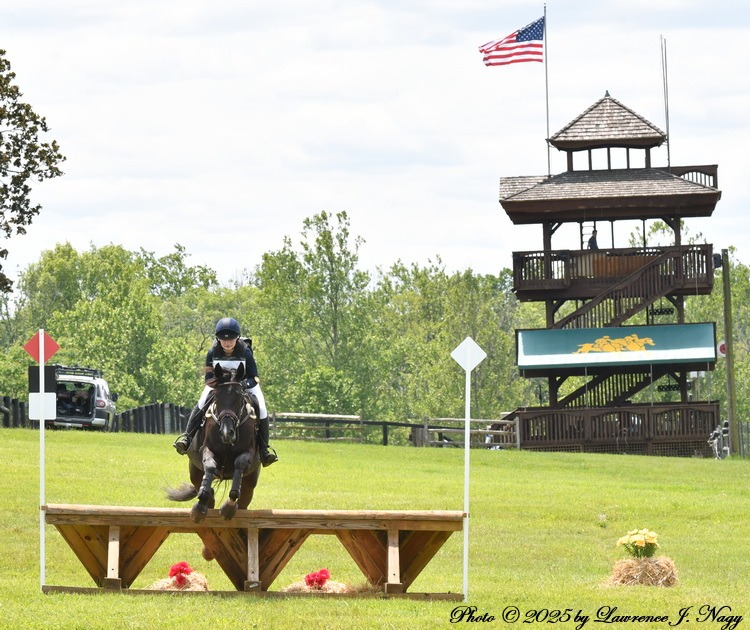
Leeci Rowsell, daughter of course designer Morgan Rowsell and his wife, Virginia, won the Novice B Division with Corstowns Espresso Martini. She got some helpful hints from Alice Tarjan, best known as a dressage competitor. (Photo © 2025 by Lawrence J. Nagy)
Essex offered a chance for people to get together with others involved with equestrian sport, or just horses in general. The volunteer pool came from that group. At the water complex, Beth Groblewski was a fence judge, something she has been doing since she stopped competing at Essex after the first two years it was held at Moorland.
“I volunteered because I live right up the road,” said Beth, who runs Fox Bend Farm.
“Now that I’m not competing any more, I give back. It takes a lot of volunteers to keep it going,” she said.
Tailgaters were lined up all along the area with a view of the water. Sponsors had tents where they welcomed guests, alongside those from local groups such as the Somerset Hills Pony Club and Tewksbury Trail Association.
Guy Torsiliei, who runs the Far Hills Race Meeting with Ron Kennedy, hosted Fox News star Jesse Watters and his family. Jesse moved from New York to Bernardsville and became part of the Somerset Hills Community. He enjoys skeet shooting at Moorland and is becoming a regular at Essex.

Jesse Watters and daughter Gigi, 3, with Guy Torsilieri in the tailgating area.. Photo © 2025 by Lawrence J. Nagy
“I haven’t ridden a horse yet, but one of these days I’ll get up there and try not to fall off,” Jesse told me.
Presenting sponsors for Essex were Pure Insurance and Land Rover of Parsippany, a full-service dealer of luxury brands that is expanding its involvement. Other sponsors included Kienlen Lattmann Sotheby’s International Realty, Hunt’s End Farm, Hewitt Home Heating, Purina Animal Nutrition in conjunction with Somerset Grain & Feed and Sergeantsville Grain & Feed, and Corcoran Sawyer Smith real estate.
Dr. Greg Staller’s Running ‘S’ Equine Veterinary Services sponsored the riders’ tent that were also open to horse owners and grooms. Marilyn noted donations of more than $20,000 helped keep the event running, with individual supporters contributing.
Essex gives back beyond the equestrian scene, benefitting the Life Camp in Pottersville, which provides an enriching summer day camp experience for 300 youths daily for six weeks during July and August. Campers between the ages of 6 and 13 come from the greater Newark public school system, as well as from Newark Charter School Programs.
click here for results
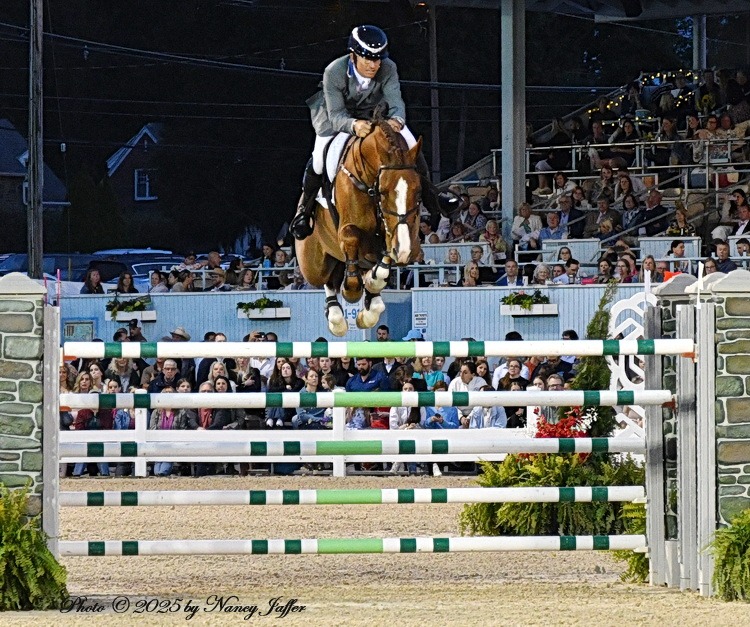
by Nancy Jaffer | May 30, 2025
Devon was packed wall-to-wall with spectators, from the ringside blue benches and the fans in the jammed standing-room-only area behind them, up to the box seats. There were enthusiastic visitors in every nook and cranny that would permit even a mere glimpse of the Dixon Oval.
Thursday night was the $226,000 Sapphire Grand Prix, a must-attend for many families from Philadelphia’s Main Line, even with parking at $80 a car. The class is a tradition like no other in the U.S. You can compare the enthusiasm level with that encountered at the Dublin Horse Show or Aachen.
Even if Devon is the only horse show these folks attend, coming once a year — every year — has given them a certain degree of familiarity with the sport and its players.
Number one on their hit parade is McLain Ward; the class is named after his late, great mare, twice a winner of the class. As McLain cantered into the arena on Callas, the crowd roared a welcome even before his name was announced. And when he collected 4 faults for a rail at the final fence, unlucky number 13, there came a high-decibel roar of sympathy.
He had flown in from Europe to compete at a show for which he feels a special affinity, and when it ends this weekend, he’ll fly back to ride for the U.S. team in France. But he always makes a point of riding at Devon.
As it happened, designer Anderson Lima’s course yielded a jump-off of six riders, not all of whom were familiar to most of those in attendance. But they still cheered and clapped.
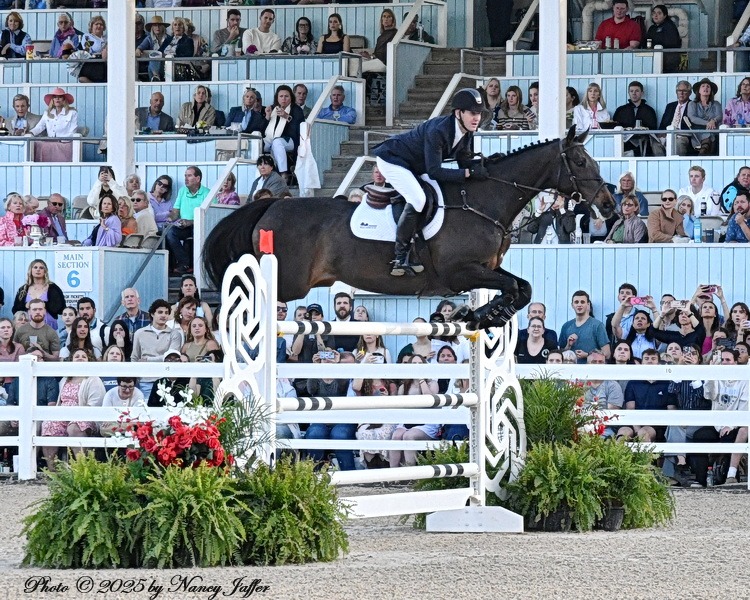
McLain Ward and Callas. (Photo © 2025 by Nancy Jaffer)
Four of the next generation of show jumpers made the cut from the starting field of 25, but the honors went to the veteran Aaron Vale, age 56, and the high-flying Carissimo 25. Though Aaron has competed at the show in the past, he is not a regular like McLain, who has won the grand prix 12 times. Yet Aaron quickly won over the crowd, and he loved it.
“It’s a lot more fun when someone comes and watches you do this,” he said.
“I do this every day at home by myself, with just four or five people watching.”
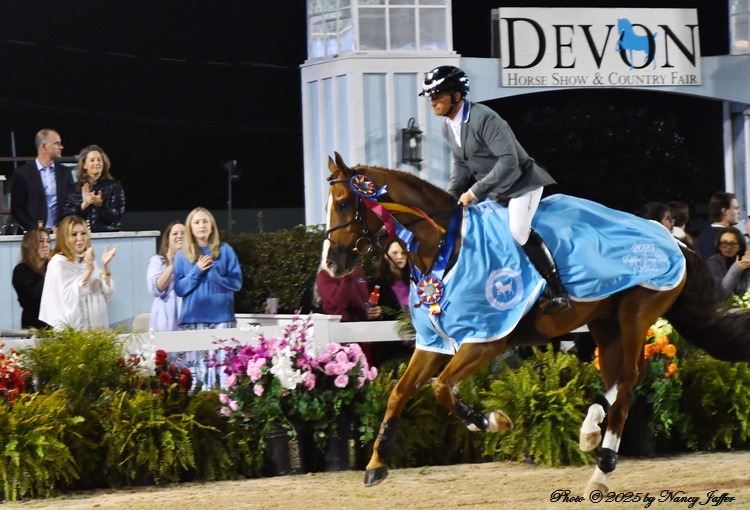
Aaron Vale and Carissimo 25 enjoy their victory gallop. (Photo © 2025 by Nancy Jaffer)
Aaron enjoyed the advantage of going last in the draw, so he had a little time to see how the course rode. Ireland’s perennial team rider Shane Sweetnam was slotted first in the tiebreaker, producing a very professional effort in 34.29 seconds on the 9-year-old Corian van Klapscheut Z, who was jumping in his first 4-star grand prix.
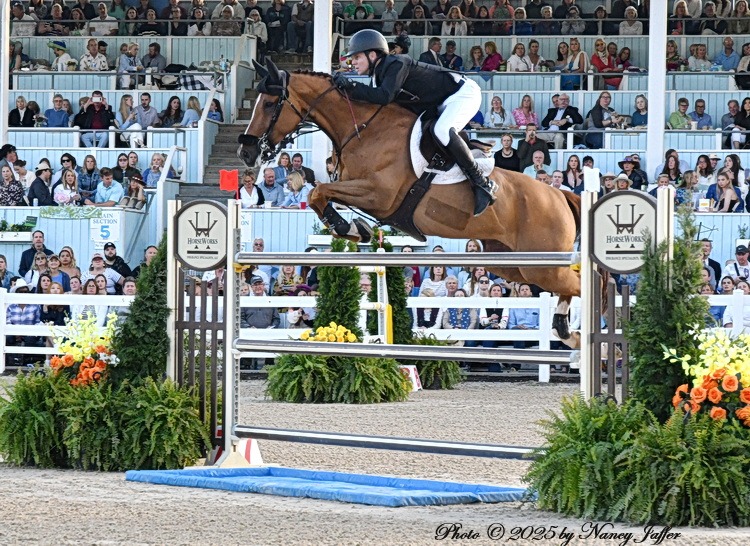
Ireland’s Shane Sweetnam was second in the grand prix. (Photo © 2025 by Nancy Jaffer)
While Shane noted his mount is naturally fast, he didn’t push the Zangersheide gelding, who was at the show to gain experience.
“I knew I was quick enough, but I knew I could be caught,” said Shane, who was happy with his horse.
“You ask him to do it and he does it quite well.”
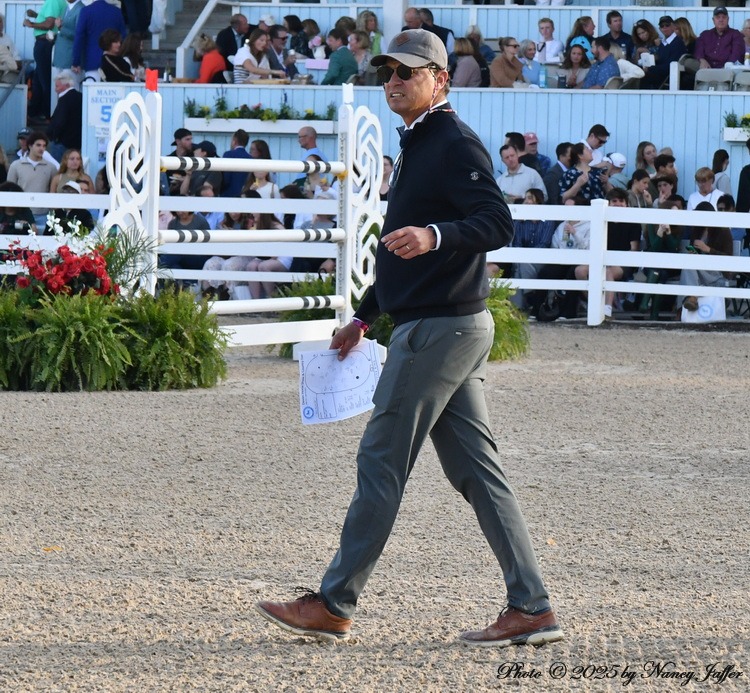
Anderson Lima designed a course with lots of challenges for the grand prix. (Photo © 2025 by Nancy Jaffer)
Speaking about his preparation for the jump-off, Aaron reported, “I went up in the stands to watch Shane in person.” Aaron’s Holsteiner has a big stride and is “a bit of a slow mover, so time allowed is a bit of an issue sometimes.
“Going later with him really gives me a chance to watch and see where I can leave a stride out and cut a turn and whatnot. If I can get moving early, that puts me in a groove with him.”
Getting an in-person overview of the ring is important.
“You get a better judge of things than on the TV screen,” Aaron explained.
“I wanted to see the strides he (Shane) did. I kind of had my plan and I watched him and then I tracked everybody’s time behind that.

Aaron Vale and Carissimo 25 were flying high at Devon. (Photo © 2025 by Nancy Jaffer)
“I figured if I could do eight strides from one to two and two to three, which I ended up doing, I thought that would really kind of get me in a rhythm where I was able to just kind of coast the rest of the way in.”
He noted, “There was maybe one stride less available to the last fence, but I was able to peek at the clock as I was coming out of the in-and-out. It looked like I was up far enough that I could just take the eight strides and still make it.
“My only concern was when he (Carissimo) got there, he was a little slow. He jumped real high and spent a little time in the air, and I was like, `Oh no, that might have done it, the height.’ But it was good enough.”
He was clocked in 33.70 seconds, which did the trick and earned the approval of the crowd. Aaron’s warmth reaches out to people, whether he is on a horse or just walking around the showgrounds. He;s a friendly, folksy guy, whose business is called “Thinks Like a Horse,” and he does. A native of the Ocala, Fla., area, at one time he was best known for his record in that region. But since getting together with Carissimo in 2023, he has become a world traveler and a regular on U.S. teams.
When Carissimo came up for sale “he showed up at my barn. I didn’t even really know it. He’s a super talent, tons of ability,” said Aaron.
“We’ve had some really big results. I’m just trying to find more consistency.With his ability, I feel like we should be having this result almost every week. As you develop a partnership and you find some tricks to the training and communication, maybe we’ll get there. We’re in this position more often.”
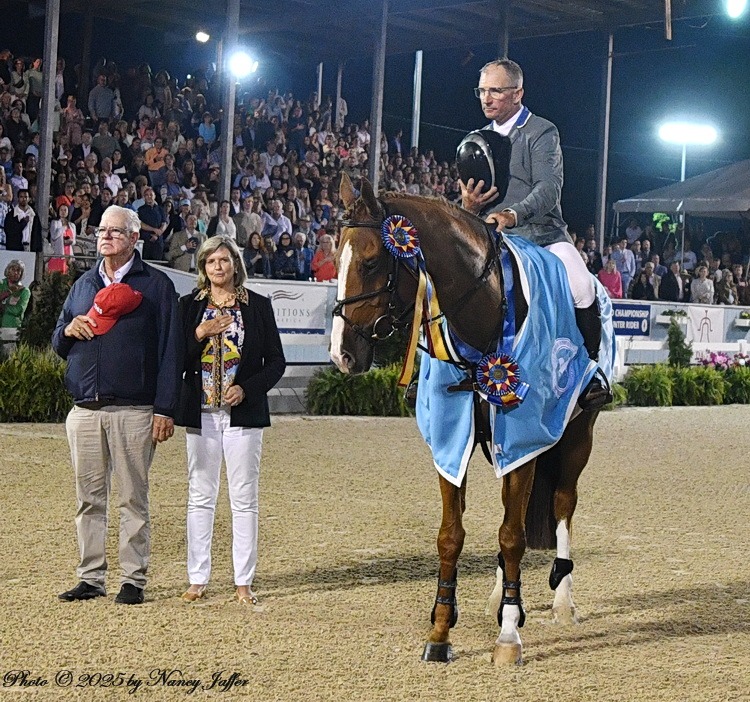
Aaron Vale listens to the Star-Spangled banner being played for his win, with ownership group members Don and Nancy Stewart standing by. (Photo © 2025 by Nancy Jaffer)
Aaron was fifth in line for the Paris Olympic squad (only three competed) in 2024, rode on the U.S. team that won the Aga Khan trophy at the Dublin Horse Show after the Games, and then finished third in the prestigious grand Rolex Grand Prix of Ireland at that venue.
Third place at Devon went to Alex Matz, whose father, Michael, was often a winner in the Dixon Oval during the twentieth century before switching careers to becoming a successful race horse trainer.
As Alex noted about Devon’s special meaning to him, “It’s my hometown show, it has one of the best atmospheres of any shows we have in the States.” He was timed in 34.69 seconds with Ikigai.

Alex Matz and Ikigai. (Photo © 2025 by Nancy Jaffer)
“My dad won this grand prix a lot, so I try to use any wisdom that he passes on,” said Alex.
Aaron chimed in, saying cheerfully, “I saw him discussing some angle he (Michael) wanted him to take to a warmup fence.”
Alex replied a bit sheepishly, “I didn’t do that. I spaced out and I did something else.”
His father was a fan of Ikigai, a Dutchbred stallion, when Alex tried him in Europe, and urged Virginia McNeil to go over the pre-arranged budget to purchase him. The chestnut turned out to be a great buy; Alex was leading international rider at Toronto’s Royal Winter Fair last year.
The under-30 set was represented not only by Alex, but also by Alexandra Worthington on De L’oiseliere in fourth place, followed by Chloe Reid, who had a rail down with Crossover 4 and Baylee McKeever on Formidable, experiencing a run-out before finishing the course. It was the first 5-star for Baylee, the daughter of Lee and Erika McKeever, pillars of McLain’s stable.
Update May 31: As the show ended, Aaron Vale was named Leading Open Jumper Rider and Carissimo 25 the Leading Open Jumper.
Click here for results
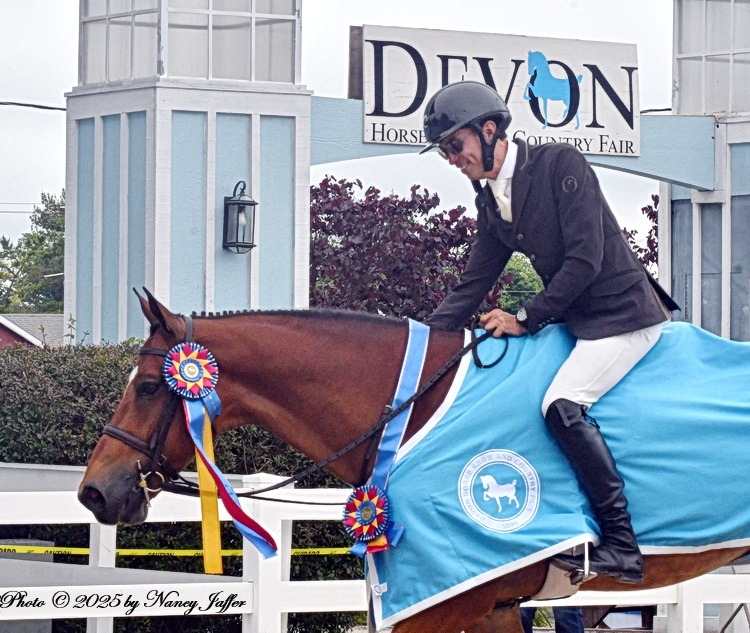
by Nancy Jaffer | May 29, 2025
It was a morning of peaks and valleys at the Devon Horse Show on Thursday for Colin Syquia and Jennifer Hannan, as the couple shared a wide range of emotions.
There were smiles for Colin’s victory with Front Page in the show’s $50,000 USHJA International Hunter Derby, and tears as Jennifer’s beloved mount, Mindful, was given a farewell ceremony in the same arena.
But as she wiped her eyes, Jennifer noted the way it happened was “actually a double high, so great for Colin to win today” and “for Mindful to retire that way.”
Front Page, a Belgian warmblood, moved up from seventh place in the classic first round, earning a mark of 101from one of the two sets of judges, followed up by a 100 in the second round, the handy. The derby was a major goal for Colin, as Front Page is shown primarily in the amateur division by his owner, Cynthia Sulzberger. She’s a member of the family that publishes the New York Times; hence, her horse’s appropriate name.
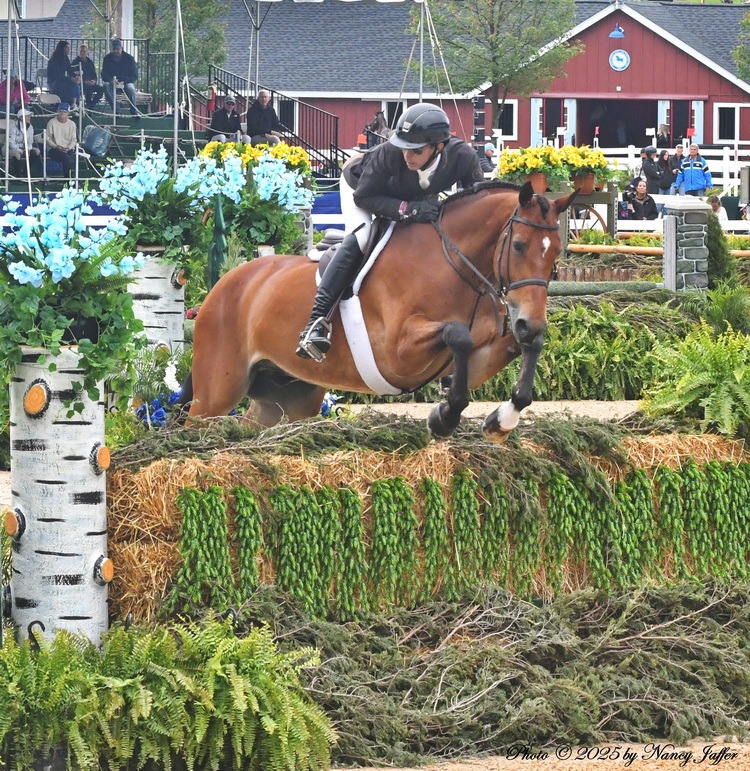
Colin Syquia and Front Page. (Photo © 2025 by Nancy Jaffer)
Front Page, who was champion in the second-year green hunters at Devon two years ago, “loves this venue. like I do. It’s iconic. You feel the energy. It makes you want to perform better. It’s a special place,” said Colin.
Referring to the historic trophies on display at the showgrounds, he noted, “If you’re lucky enough to have your name and your horse’s name engraved on that trophy, it’s immortalized.”
He said he and Front Page “have gained a great relationship.” He didn’t focus on every single class in the run-up to the derby, instead opting to get him stronger and looser. “So in the end, he’s fresh and happy.”
The horse knows when a competition is special.
You might not even notice him at an ordinary show, Colin said but “When he comes here, Kentucky or the National, he just grows a hand, he’s alert, his jump is electric.”
The next goal Colin has with the horse is the finals of the Platinum Performance/USHJA International Hunter Derby Championship in Kentucky this summer. There he will meet up again with Hunt Tosh, a three-time winner in Kentucky, who settled for second at Devon with the Wheeler family’s Cannon Creek, and Michael Britt-Leon, third Thursday with Mark Dorfman’s well-behaved stallion, Prime Time. Like Cannon Creek, he is a Holsteiner.
The leader after the first round, which drew 31 starters, was Four Aces, ridden by David Wilbur. But the momentum didn’t last and that combination wound up ninth after the top 12 came back for the handy round.
“It was a great course today I thought, both rounds,” said Hunt, noting he had a rub in the first round.
“It was a great atmosphere we all have a good time in the schooling area and watching each other go. Every great hunter, I believe, has a story behind it at Devon.”
People who have horses at the level of the top performers in the Derby “start planning their careers and their show schedules around Devon,” Hunt mentioned.
Michael felt like “a little bit of an underdog coming out” because the horse is new for him since last fall, when he rode him at the indoor shows. But he said Prime Time is “very, very mellow…you know he’s going to get to the other side of all the jumps.”
Since this was their first derby together, he had “low expectations and just wanted to have a nice smooth round today.”
He said the course designed by Alan Lohman offered many possibilities.
“The jumps were large and there were definitely a lot of questions on the course that you could kind of make your own and keep it exciting,” said Michael, admitting to being “a bit of a ham,” adding he felt Hunt and Colin had the same inclination.
Mindful, a 21-year-old Hanoverian who could be 10 if you judged by his well-kept looks, was surrounded by friends as his saddle was removed for the last time and replaced with a blanket of white roses.
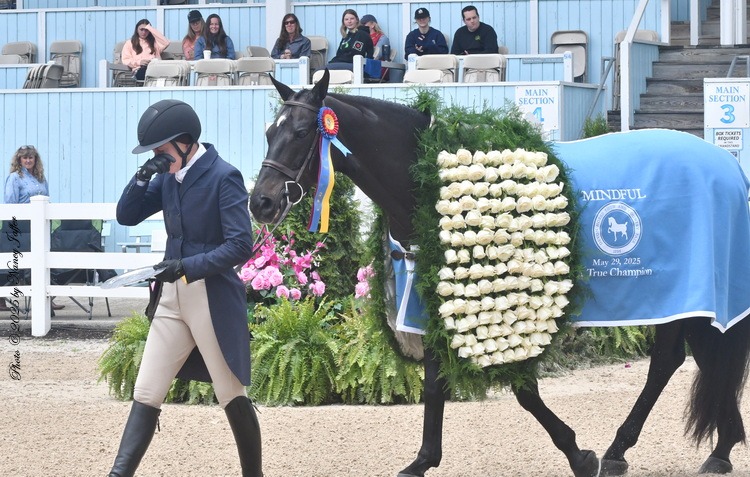
Jennifer Hannan wipes away her tears as she leads Mindful out of the arena after his retirement ceremony. (Photo © 2025 by Nancy Jaffer)
His owner, Selma Garber, and former rider, Kelley Farmer, were on hand to wish him farewell for his retirement in Rhode Island. He will be turned out with his buddy, Olympic Fire, another hunter, and get plenty of his favorite treat, Publix iced oatmeal cookies.
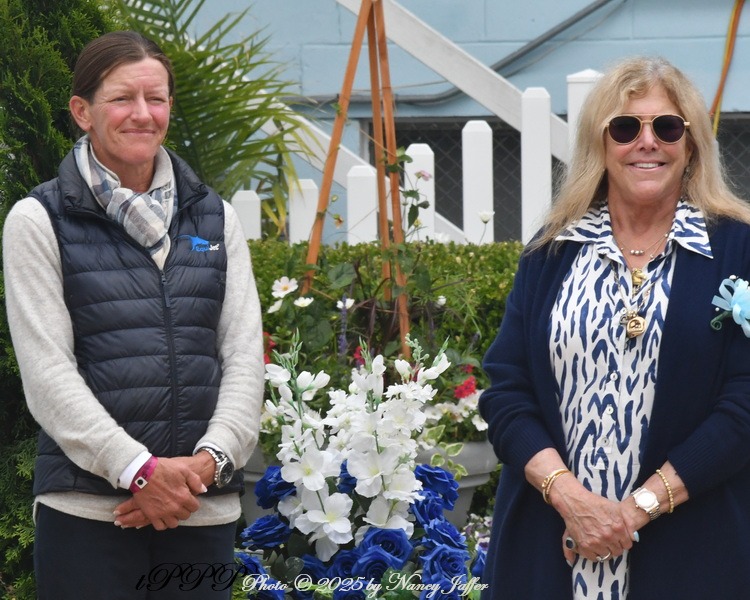
Mindful’s former rider, Kelley Farmer, and his owner, Selma Garber, were on hand at his retirement. (Photo © 2025 by Nancy Jaffer)
He was imported from Europe as a jumper, and ridden by Canadian Jay Duke. He switched to the hunters and was an immediate success. Jennifer started riding him 10 years ago.
“He’s really sound and he’s great, but he’s 21 years old,” said Jennifer, explaining the decision to retire him.
Then she added quickly, “He’s still spry and very happy.”
At age 20, Mindful won a hunter derby at the Winter Equestrian Festival in Wellington, Fla. But at the beginning of their relationship, it took some time for Jennifer to connect with him.
The first year, she got bucked off regularly, and then realized “I was going to learn from him. We ought to look inside our horses and figure out what makes everything tick.”
Jennifer added she is, “Grateful for an incredible experience with him. He has changed my whole career.”
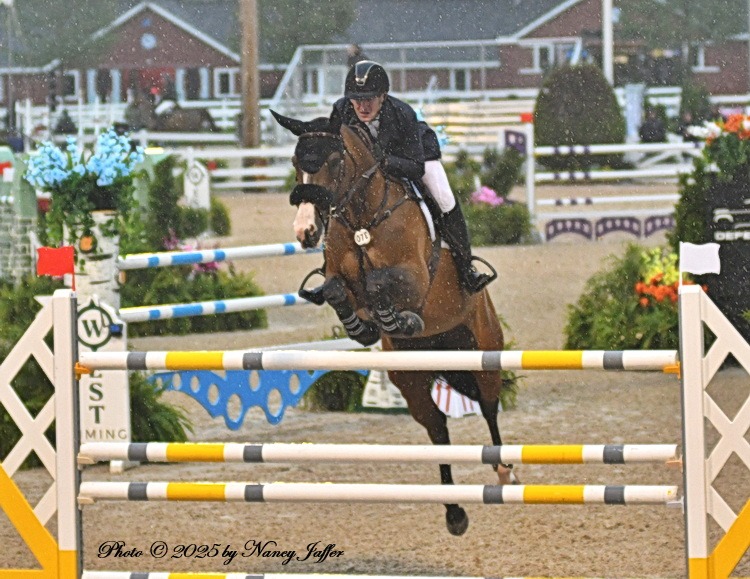
by Nancy Jaffer | May 29, 2025
As I was on the rail taking photos of the jumpers at the Devon Horse Show, I heard an older woman in the seats behind me telling her friend as a certain star rider entered the arena, “That’s McLain Ward. I saw him on TV at the Olympics, and now he’s at Devon!”
McLain has fans in many places, but nowhere more so than Devon, where he gets the loudest cheers when he enters the ring and also when he leaves, win or lose.
Wednesday night, it was a win, as he and a newer horse, the Holsteiner La Serra “a very nice, careful mare,” finished ahead of 34 other starters in the two-phase $38,700 Main Line Challenge Stake, which we used to call a power and speed. The fences were set at 1.45 meters (as opposed to up to 1.5 meters for Thursday’s 4-star Grand Prix) and both segments were timed. La Serra was fault-free in 31.32/31.05 seconds.
The complicating factor was the drenching rain and cold, very uncharacteristic for late May in the Philadelphia suburb. McLain was totally soaked, and still dripping after he dismounted. You can see the downpour in the lead photo on this website.
I asked about the weather as a factor affecting the competition and Mclain said, with a smile,”It’s part of the game. Cold and wet, but we have to make a living. So…”
For awhile, he was first and second. Snapchat van de Broekkant Z, a 9-year-old Zangersheide finished just behind his stablemate (0/0, 30.78/32.76). But Kaitlin Campbell had something to say about it and ended as the runner-up on the Oldenburg gelding Bull Run’s Hesed (0/0,32.20/31/76).
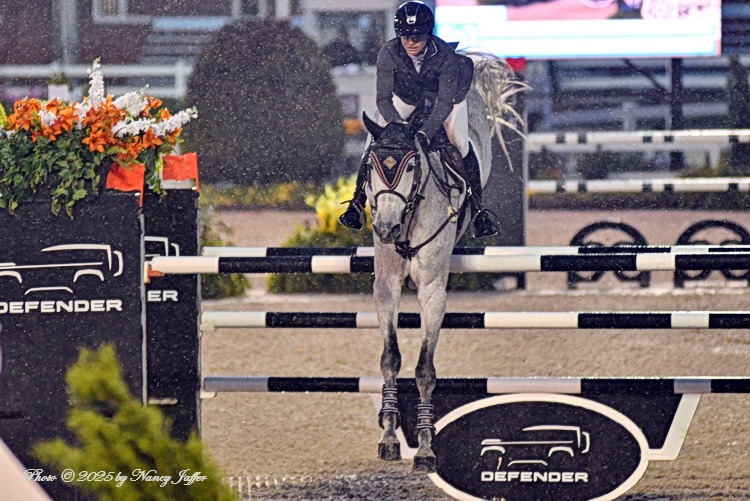
Kaitlin Campbell and Bull Run’s Hesed. (Photo © 2025 by Nancy Jaffer)
Jessica Springsteen, appearing at Devon for the first time in 10 years, was third with the Swedish warmblood mare Galaxy Girl (0/0,31.88/31.91).
McLain is in the process of building his string of horses. His longtime partner, Contagious, will be retired, he revealed, but he has a new star in Imperial HBF, who put in the crucial clean anchor round last weekend at the Rome Nations Cup to insure victory for the U.S.
Even though he will be on the team in La Baule, France, next week, McLain flew home to be part of Devon.
“These are important events and I enjoy them. It’s good for developing horses to get the experience as well,” he explained.
The grand prix is named in memory of Sapphire, the mare who won it twice with McLain in the saddle. She also retired at Devon, which strengthened her connection with the show.
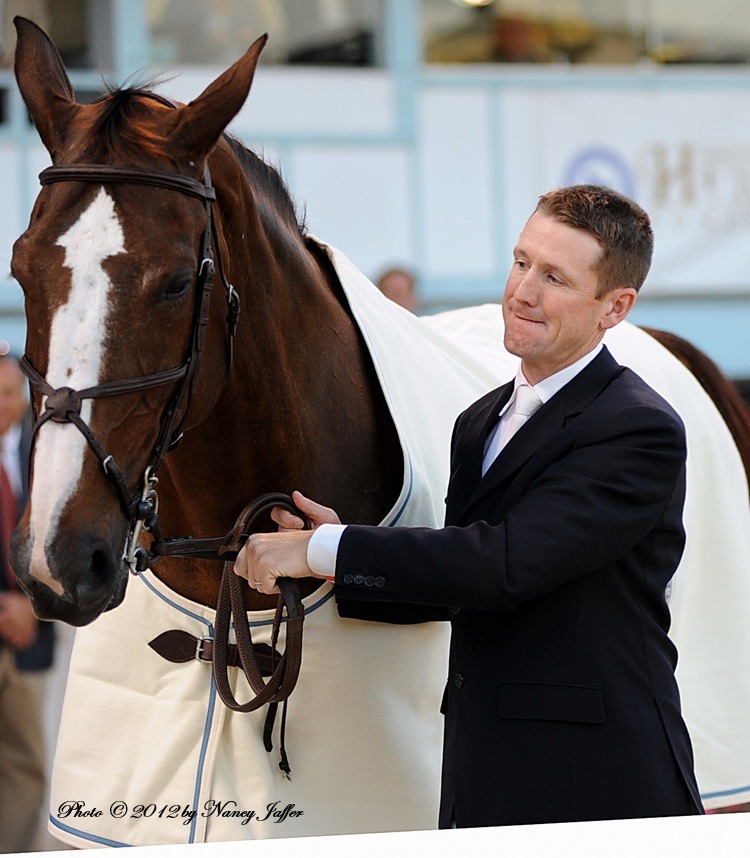
McLain Ward and Sapphire at her retirement during Devon, 2012. Photo © 2012 by Nancy Jaffer
His 10 employees are divided between Europe and the U.S., so he has excellent strings of horses both here and abroad.
Kaitlin is used to winning at Devon, where she was an achiever in the junior jumpers. She has been riding Bull Run’s Hesed since last fall and called him “a very fast horse, very elastic. It took a little bit of time for him to get to know me and me to get to know him, but it’s really come together in the last couple of months.”
Based in California where she finds the shows at Thermal a good place to “put all the pieces together” and bring horses along, she is originally from Doylestown, Pa., and rode with Patty Miller.
Thinking back to her pony days at Devon, she said riding in the show “definitely feels like coming home.”
A new owner, Mirasol Equestrian, has invested in horses for her, so she’s putting a string together with horses available for every type of class. She did the World Cup finals in April, her first senior championship.
“It was definitely eye-opening, the level of competition and the size of the fences,” she commented.
Kaitlin is hoping to qualify for the FEI World Cup Finals in Fort Worth, Texas, next year.
Jessie never had competed in the open jumper division at Devon, and always wanted to do it. She has had her horses stabled at her family farm in Colts Neck, N.J., a short commute from Devon. Her parents, Bruce Springsteen and Patti Scialfa, have their own horses at the farm, and like to ride western on the trail.
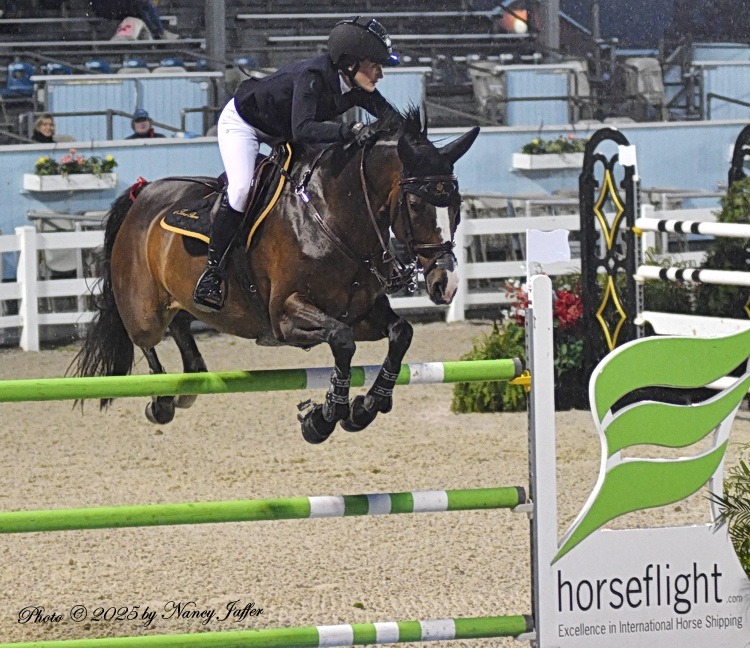
Jessica Springsteen and Galaxy Girl. (Photo © 2025 by Nancy Jaffer)
Devon has special meaning for Jessie.
“I’m so glad to be back,” she said, noting she has had flashbacks to when she competed in the ponies at the show.
“It was so much fun.”
In the grand prix, Jessie will be riding her 2021 Olympic team silver medal mount, Don Juan van de Donkhoeve, who was out for a while with an injury. She has been building him back up so he can compete in shows at the level of Devon.
Click here for results
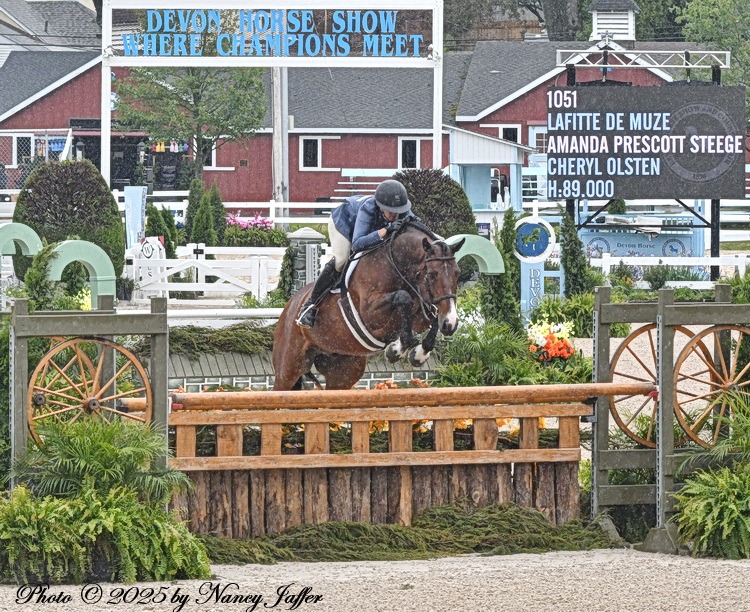
by Nancy Jaffer | May 28, 2025
They are the Devon Horse Show’s ultra hunter champions: Nick Haness, Leading Hunter Rider for the third year in a row; Scott Stewart, who piloted the show’s Grand Hunter Champion for the umpteenth time and Amanda Steege, High performance Hunter Leading Lady Rider (for the third time in four years).
They share an appreciation of their horses’ intelligence and desire to be in the game. You can see the though process of one racehorse trying to outrun another, but do show hunters understand the more subtle nuance of victory in their arena? Amanda thinks so; Scott and Nick agree.
Amanda believes that Cheryl Olsten’s Lafitte de Muze, the Belgian warmblood by Darco that she has ridden for eight years, “just really has a desire to win. I’ve never had a horse that I feel is trying to win every class as much as he is. I think that’s the thing that makes him extra special. He’s really intelligent and I think he knows when he goes in there that he’s performing.”
Lafitte was the show’s High Performance Hunter Champion, scoring a career best of 96 in the division’s final class, the stake.
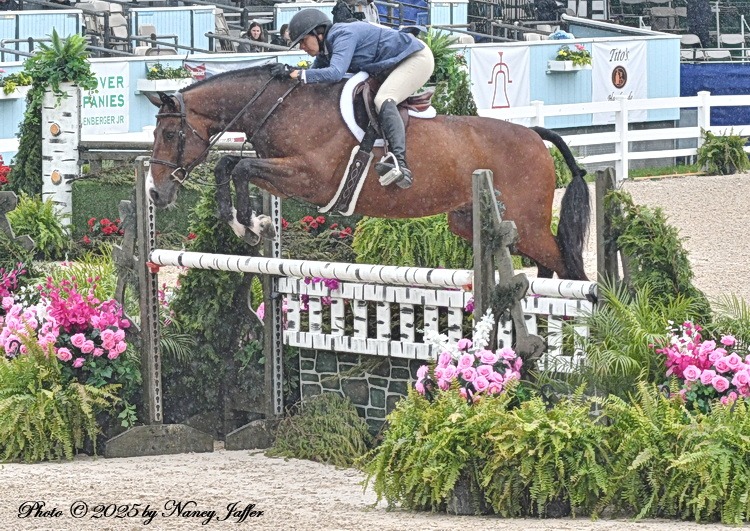
Amanda Steege and Lafitte de Muze. (Photo © 2025 by Nancy Jaffer)
Devon was the only show where he hadn’t taken that championship, said Amanda, speaking of the “elusive white cooler.”
Nick, who was aboard the Ingram Family’s Odette, the show’s Leading Mare and Green Conformation Champion, is “amazing, probably one of the smartest horses I’ve ever ridden. She’s incredibly in tune with the rider. I don’t think I’ve ever asked her to do something that she didn’t do for me,” he said of the Oldenburg, who won all the jumping classes in her division. If you have a great mare, she can do anything.
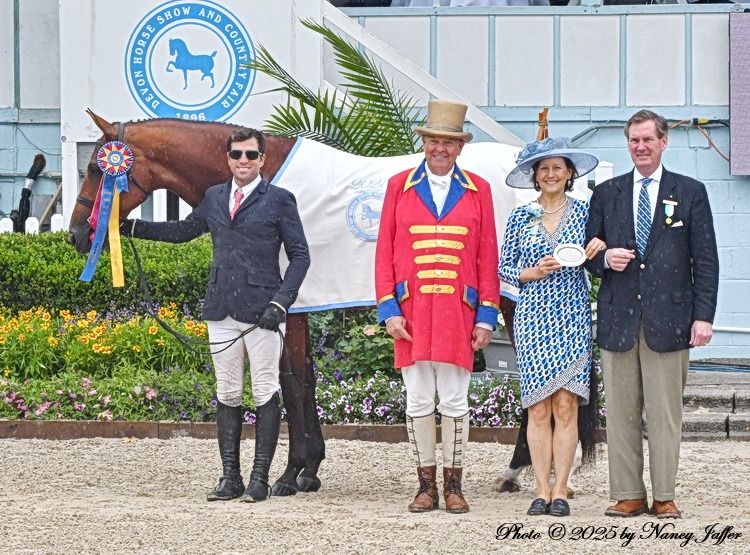
Leading Hunter Rider Nick Haness with Odette. (Photo © 2025 by Nancy Jaffer)
“I’m so excited and blessed to be riding her again this year, especially at venue like Devon,” said Nick, who was primarily in California over the winter, while Odette was in the East, ridden by Emily Williams and trained by Tom Wright.
Betsee Parker’s Grand Hunter Champion, California Love, is described by Scott as “beautiful, scopey, athletic.” The horse he bought as a three-year-old “is very laid back. When it’s a little more (atmospheric) environment, he picks up in a good way.”
Although Scott has been a winner repeatedly over the decades at Devon, the thrill remains.
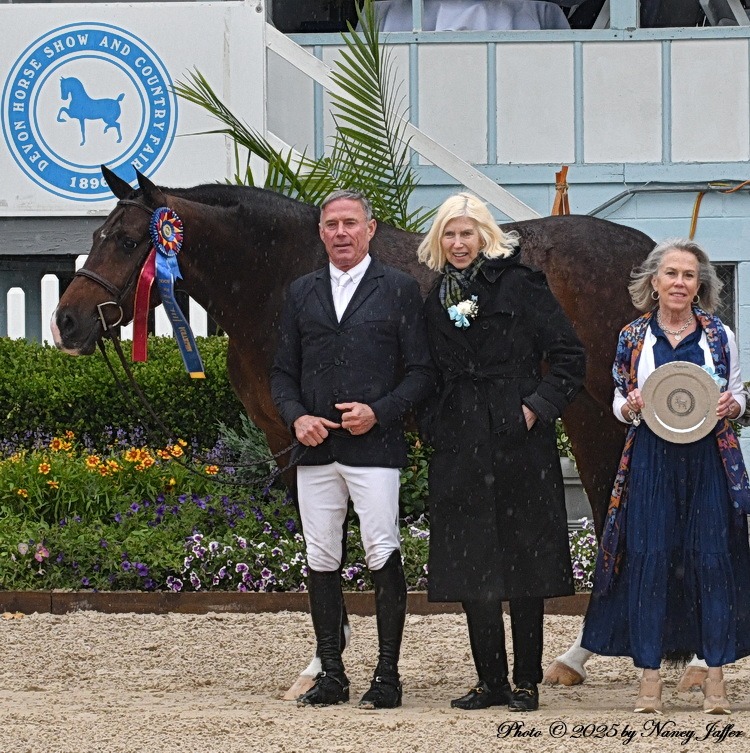
Scott Stewart and California Love with owner Betsee Parker. (Photo © 2025 by Nancy Jaffer)
“It’s still very special. The ring has great memories for me,” he observed.
Amanda’s connection with Devon started long before her personal involvement.
“This show is important to my family,” she explained.
“I have a picture of my great grandfather showing here in 1913 on his pony. My mom’s family, the Smiths, they’re from Blue Bell and Fort Washington (Pa.).
“My mom showed here when she was growing up. It was the same course every year. She jumped the first jump, then her pony he stopped at the second jump.” She would fall off and “had to walk the whole way back to the ingate.” Amanda did add that her mother persevered and finally made it around the course.
Click here to go to the results website, then click on Tuesday, May 27 and Wednesday, May 28, to see hunter champions
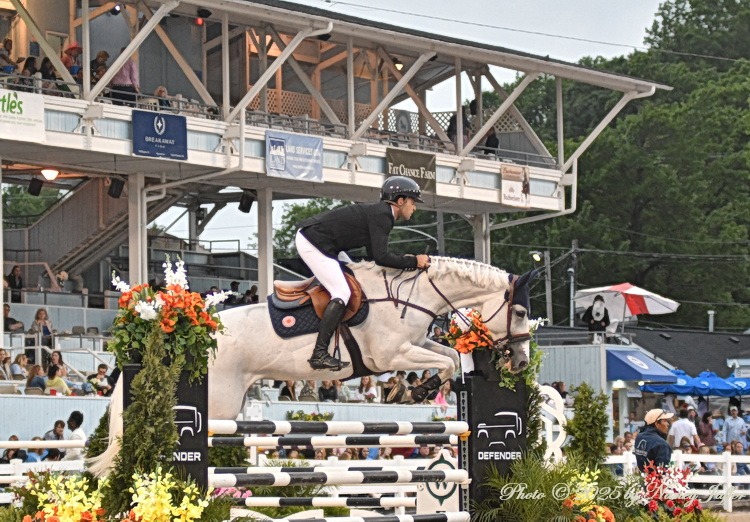
by Nancy Jaffer | May 28, 2025
The Bluman cousins made a real statement in the Devon Horse Show’s opening show jumping competition, sweeping the top placings for the Jet Run Devon Welcome Stake.
Daniel took the one-round class on his longtime partner Gemma W., while Mark finished as runner up with Ubiluc, less than a second behind the winner’s clocking of 56.21 seconds over the Anderson Lima-designed course.
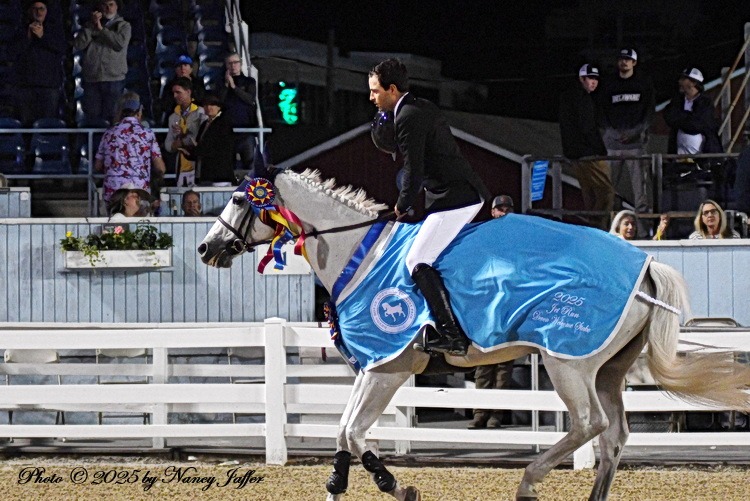
Daniel Bluman enjoys his victory lap on Gemma W. (Photo © 2025 by Nancy Jaffer)
Another Bluman, Ilan, was further down in the 43-horse field, winding up thirty-seventh and thirty-eighth with his two mounts.
There is naturally a bit of rivalry among the cousins, who grew up like brothers in Colombia, but they’re all part of the same business, so a winning finish by one is a winning finish by all.
“It’s probably the first time we’ve been 1-2 in a class. It’s always nice to have a family win, it feels great,” said Mark.
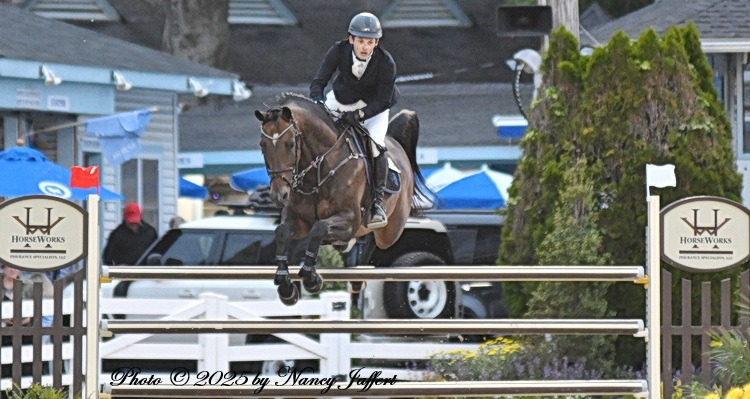
Mark Bluman and Ubiluc. (Photo © 2025 by Nancy Jaffer)
“We really love this show, we try to come every year,” noted Daniel. “We all want to be competitive, so we’re just having fun, doing what we love.”
Daniel became an Israeli citizen nine years ago. His cousins are still Colombian, but are working on switching their citizenship.
More than a dozen of the riders entered the class on two horses, with a goal of being competitive on one mount and giving the other a look at the arena and the spectators, who are always numerous and appreciative.
Daniel took it easy with Hummer Z, his mount for Thursday’s featured Sapphire Grand Prix, but he went for it with Gemma, who will have a few days off until Saturday night’s closing jumper class.
“We’ve been together for many years we know each other great,” he said of the reliable grey mare, “so for me to go at that speed doesn’t take much of an effort. She’s a fantastic horse, she’s won so much. I thought I could win the class without her making a huge effort.
“It’s always fun to beat Markie,” Daniel added slyly.
“He’s a fantastic rider. We’re all competitive. Actually, his plan was not to go fast. I think when he saw I had been fast, he got a little extra competitive and went for it. He was just not enough today.”
Family comes first, before who gets the ribbons.

Seven-year-old Tiris Carlin was thrilled to get Daniel Bluman’s ribbon from the Jet Run class. (Photo © 2025 by Nancy Jaffer)
“There’s always a rivalry, but a healthy one,” Daniel explained.
“We all work together. We run the business together, we live pretty much together, so it’s a very healthy rivalry. But of course we want to win.”
Even so, “if it had been the other way around — I’m second, he’s first — I’m just as happy. I beat him, maybe tomorrow he beats me.”
Daniel makes Devon a regular stop on his circuit.
“I think the atmosphere is lovely, the people are very nice, the crowd knows it’s like a tradition to come and be part of the horse show. It’s our responsibility as riders and professionals to support and come to these events. It’s what really keeps the sport alive. I love being part of it.”
The class is named in memory of Michael Matz’s famous horse, Jet Run, many times a winner at Devon. Michael’s son, Alex, rode Ikigai in the class, finishing thirteenth, just out of the ribbons.
click here for results
by Nancy Jaffer | May 27, 2025
Reacting to “recent opinion pieces that raise critical concerns and alarming allegations regarding the unethical treatment of horses in our sport,” the U.S. Equestrian Federation Tuesday sent out a strongly worded statement calling on “every member of the equestrian community…to stand up for our horses.”
USEF CEO Bill Moroney and COO/Legal Counsel Sonja Keating advise that “When we unite, we can transform the sport, making it stronger and more sustainable for the future.”
Click here to read an article on this website about discussion involving governmental oversight of horse sports.
Moroney and Keating noted, “We call on every member of the equestrian community to join us and stand up for our horses. When we unite, we can transform the sport, making it stronger and more sustainable for the future.”
Here is what else they had to say: We unequivocally agree that we cannot tolerate mistreatment or doping of horses. Such actions are harmful to horses and bring our sport into disrepute. As a community, we are responsible for holding each other accountable to ensure the respectful treatment and proper care that horses deserve.
USEF maintains sport integrity and horse welfare through regulations. We are focused on strengthening our enforcement mechanisms while maintaining integrity in our processes. We want to share the following most recent measures and efforts to improve our sport and safeguard horses.
• Establishment of stricter penalty guidelines for rule violations.
• Expansion of rule enforcement for unethical treatment of horses.
• Adoption of the requirement that members must participate in investigations.
• Introduction of a new warning card system, with real-time online updates for issued warnings.
• Allocation of additional resources for investigating and resolving reports of horse abuse and doping.
• Simplification of reporting methods through electronic reporting forms online and an anonymous texting platform for making reports. Learn more here.
• Redesign of the USEF website for more user-friendly access to information regarding the unethical treatment of the horse and the disciplinary process. Learn more here.
• Innovative advancements in operations for the equine anti-doping sample collection and case management system.
Additional efforts for implementation by January 1, 2026:
• Enhance the equine anti-doping program by collecting and testing hair samples to detect prohibited substances.
• Expand educational resources on unethical treatment of the horse and demystifying the USEF disciplinary process.
• Create resources on what a good life for horses means, such as providing adequate nutrition, recognizing signs of exhaustion, distress, or onset of illness, and proper veterinary care.
• Educate licensed officials, participants, and competition management on the unethical treatment of horses and the new warning card system.
• Clarify the roles and responsibilities of USEF licensed officials and appropriate actions to take for unacceptable conduct.
• Enhance sports governance structures, transparency, compliance, and training for USEF stakeholders.
• Host live town halls on USEF’s horse protection efforts.
• Establish opportunities for dialogue and improve communication.
Your vigilance will promote a safe and respectful environment for our horses to train and compete. Our equestrian community must unite and uphold standards of good conduct, where every member actively fosters an environment of accountability and respect.
We need you to promote respect and make a positive impact in the following ways:
• Always be a role model of good sportsmanship and horsemanship.
• Verify facts. Fact-check headlines and emotionally charged social media posts from credible sources before sharing to avoid misinformation and hasty judgments.
• Don’t gossip or spread information you have not verified. It harms our sport and further threatens our social license to operate. Second-hand or third-hand information is often unreliable information.
• Report incidents to USEF that you see or know to be true; we rely on your awareness. Know your reporting obligations and Know how to report.
• Immediately document the incident with a photo or video and notify a Steward, TD, or Competition Management if on competition grounds. Always notify USEF whether the incident occurs on or off competition grounds.
• Text 28733 (2USEF) or complete a report form to report any concerns.
• Familiarize yourself with the four-step resolution process for reports and the timelines for resolving reported rule violations.
• Disciplinary proceedings are legal proceedings. Initiating disciplinary action requires a logical and rational unbiased assessment of the facts and circumstances. Thoroughness in the fact-finding stage is crucial, and it takes time. USEF affords members a fair and equitable process, which is time-consuming. The resolution may extend longer when criminal authorities or civil litigation is involved. USEF collaborates with but does not interfere in criminal investigations or civil lawsuits. As a private association, USEF lacks subpoena power. Criminal and civil proceedings have greater access to compel witnesses and information, leading to the discovery of evidence. Information from those proceedings aids in resolving matters through USEF disciplinary processes.
• Recognize that USEF cannot take disciplinary action based solely on gossip, a tip, or video posted to Facebook or other social media platforms. Eyewitness testimony or other evidence must corroborate an incident to prove a rule violation and withstand legal scrutiny.
• Educate yourself on USEF drug and medication guidelines.
• Keep informed of the latest research and evolving best practices for training techniques and equipment use.
• Provide constructive feedback by emailing feedback@usef.org. Your constructive feedback is essential. We ask that you provide it respectfully and thereby contribute positively to the improvement and growth of our community.
by Nancy Jaffer | May 21, 2025
Horse welfare continues to be in the forefront among governing bodies, whether they are of the equestrian or national variety.
The U.S. Equestrian Federation this month held a “collaborative summit” with reps of its affiliates to examine a number of issues affecting horse sports, including those touching on social license to operate.
USEF Chief of Sport David O’Connor presented a draft of the “USEF Horse Welfare Stoplight Guidelines,” listing the differences among horse friendly, non-horse friendly and unethical treatment of a horse. In line with that, training techniques and practices to guide officials and participants about acceptable versus unacceptable behavior were offered. An educational campaign centered around horse welfare will be launched this summer.
As USEF noted, “Self-regulation is preferable to being regulated by outside entities.”
A case in point: An arduous new requirement that managers of all equestrian competitions in the U.S. would have to register with and report to the U.S. Department of Agriculture, but which has been at least delayed and will not go into effect during 2025 show season.
The requirement was part of a proposed amendment to the Horse Protection Act, which originally was designed to stop the practice of soring in Tennessee Walking Horses and breeds that were similarly abused. USDA and its Horse Protection team will continue to work on what’s next,including additional postponement, and will continue to seek stakeholder input.
Elsewhere, however, the extent of governmental involvement already is an issue in Europe. Horse & Hound cited a discussion on equine sport-horse welfare during a May meeting of the Intergroup on the Welfare and Conservation of Animals in the European Parliament.
Danish European Parliament member Niels Fuglsang, who chaired the session, has been pushing for tougher EU oversight of horse welfare, seeking to have a directive now limited to farm animals to expand for inclusion of sport horses and allow sanctions for mistreatment.
Fuglsang has advocated for banning double bridles across the EU (would North America be next?) and expressed frustration with slow progress after meeting with FEI president Ingmar de Vos last year
Dr. Mette Uldahl, vice president of the Federation of Veterinarians of Europe, maintained, “We urgently need to educate modern equestrians in equine behavioral science. But education is not alone sufficient, we need to have firm governance and regulation.”
So you can see the direction in which this is headed.
Uldahl stated, “Welfare must be evaluated through objective indicators, such as body language, tail movements, ear position, eye and facial expressions and behaviors like open mouths. Horses showing signs of pain, fear or discomfort must not be rewarded.”
She added, “Harmful or coercive equipment that reasonably risks causing pain, injury, suffering, or fear must be banned, and tools that fix horses into rigid positions or mask body language must not be used.
“Independent advisory boards must be empowered to question practices, raise concerns and ensure transparency. With these principles embedded, it is entirely possible to align horse sport with modern standards of welfare and public expectations.”
She added, “It’s not about revolution, it’s about evolution – but we need a mandate to make that happen. A clear step would be requiring independent advisory boards to oversee all types of horse sport.”
De Vos pointed out the FEI’s commitment to welfare, citing reforms such as removal of time limits on horse abuse cases and the implementation of recommendations from the independent Equine Ethics and Wellbeing Commission.
For his part, FEI veterinary director Dr. Göran Åkerström discussed the 37-point Equine Welfare Action Plan, which includes the newly introduced noseband measuring device and the launch of the Equine Welfare Advisory Group for external oversight.
by Nancy Jaffer | May 7, 2025
What is the social impact of equestrianism?
That’s a key question in this era of Social License to Operate; that is, public acceptance of horse sports. The answers are even more important.
British Equestrian, Great Britain’s national federation for horse sports in Great Britain, is involved with a major research project on the subject, which could become a model for other countries — many of which, including the U.S., are grappling with the same situation.
BE’s partner in its work is State of Life, which specializes in measuring and demonstrating the social and economic value created by various organizations. Sad that horse sports have to be justified these days, but that’s the case
The effort, which started with a research phase in 2024, has moved on to investigate the social value of equestrianism.
State of Life has worked with several sports and community organizations to provide in-depth analysis of their social impact. They are involved with developing a new national model dealing with the social value of sport and physical activity for Sport England. The government is seeking to estimate the contribution of community sport and physical activity to health and well-being in the country.
In the first phase, equestrian activities were proven to have benefits ranging from the social value outcomes of physical and mental health and subjective wellbeing, to individual, social and community development.
Examples: riding, stable work and hippotherapy contribute to fitness and rehabilitation, while equine-assisted therapy provides therapeutic support for those with conditions such as post-traumatic stress disorder, anxiety and depression. Engaging in equestrian activities has demonstrated an increase in confidence, employability and social connections, strengthening both individuals and communities.
Stage two will take this research to the next level, calculating the monetary worth of equestrian social value. It will demonstrate the way equestrian activity can be a vital contributor to public health, aligning with a government “Get Active” strategy. The findings will enable BE and its affiliates to showcase the industry’s impact on people’s lives across the United Kingdom, shape future strategies with data-driven insights (otherwise known as evidence), advocate for equestrianism’s unique benefits and strengthen investment and strategic partnerships.
Abigail Bevan, Insight and Research Manager at British Equestrian, noted, “We’re excited to measure the tangible impact of equestrianism, following the gathering of research, which has proven the vast benefits our sector provides to the community, by encouraging people to spend time in outdoor spaces, connecting with nature, creating friendships and enjoying partnerships with our incredible horses.”
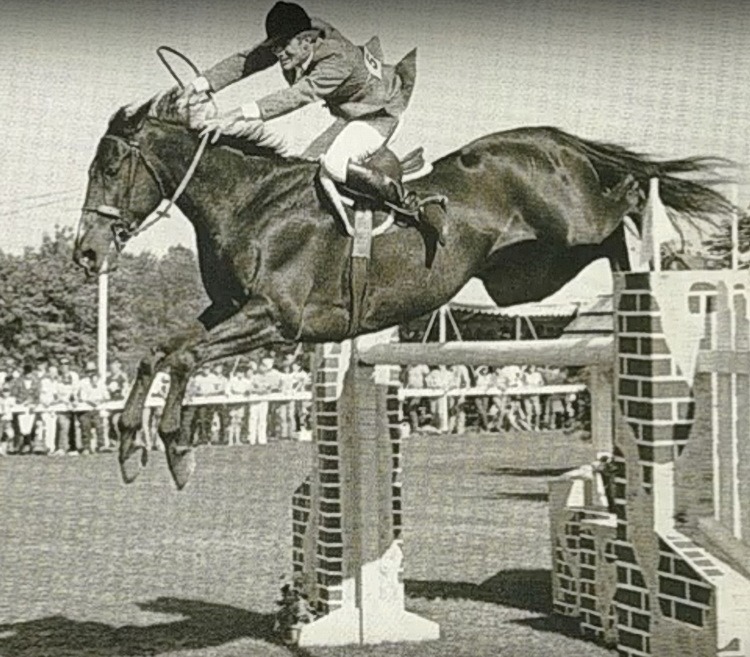
by Nancy Jaffer | May 13, 2025
A celebration of life for Rodney Jenkins, one of the world’s greatest show jumpers, will be held June 1 from 3-5 p.m. in the 1853 Club on the jumper side of the Upperville, Va., showgrounds.
The Red Rider passed away at age 80 last December, leaving memories of a stellar reputation in both the horse show and racing worlds.
He grew up learning to ride by the seat of his pants in Orange, Va., where his father, Enis Jenkins, was a professional horseman. Rodney became a huntsman, then worked for Gene Mische, who went on to be the country’s best known horse show organizer.
Rodney’s talent took him to the top of the sport, with victories everywhere from Madison Square Garden to Devon and all the other great shows. He was most famous for his many wins with Idle Dice, but other honors included being American Grand Prix Association champion and American Horse Shows Association Horseman of the Year.

Rodney Jenkins and Idle Dice.
The horseman also was part of the U,S. Equestrian Team, earning team and individual silver with Czar in the 1987 Pan American Games.
After hanging up his saddle in 1989, Rodney turned to training racehorses. He was successful at that too, until he retired for good in 2024. His best season at the track came in 2006, when his horses won $1.8 million.
He will be most remembered for his ability in the show ring, a standout with the hunters as well as the jumpers. He had a great eye for a fence, and understood what a horse was thinking almost before the horse knew what it was thinking.
Those who wish to donate in his memory may make contributions to the Virginia Thoroughbred Project, the Thoroughbred Aftercare Alliance and the Upperville Colt and Horse Show.




































